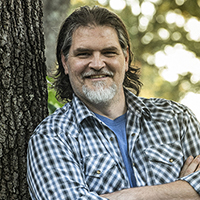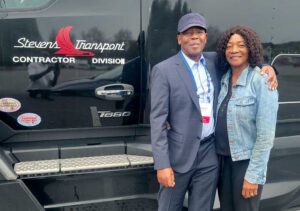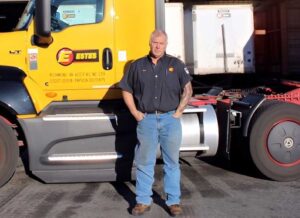Had Mike Durst started out driving for Arctic Express, his family’s transport business, he’d have been hard-pressed to cover as many miles as he has in his career outside of the trucking industry.
Durst, now 40, says he grew up working in the company, but he didn’t join the Ohio-based refrigerated hauler full-time until 2016. By that time, he’d already carved out a career that took him all over the Western Hemisphere.
“Obviously, we were all involved in the business as kids, filing documents in elementary school on Christmas break, then graduating to washing trucks and trailers and detailing,” he said. “Then I took a detour to South America as an exchange student. I learned Spanish, came back, and got a degree in pastoral ministry.
“I was a pastor in a church for almost 15 years, where I worked with both English speakers and Spanish speakers,” he continued. “Almost seven years ago, I had the awesome opportunity to come back (to the family business) as an adult, with a lot of different life experiences.”
If ministry seems an odd training ground for someone entering the trucking business, Durst said it was just the opposite — especially in his initial role working directly with Arctic Express’s drivers.
“Arctic had been through some really, really tough years and the bottom line is, the staff had shrunk by necessity of financial survivorship. Everybody was overworked,” he said. “Having been disconnected from a day-to-day view of what was going on and then coming back in with a pastoral care and counseling mindset allowed me to ask a bunch of new questions that we wouldn’t have asked before.
“In pastoral ministry you spend a lot of time talking and listening to people, meeting them wherever they are in life and seeing what you can do to support them mentally, emotionally, and spiritually, and then helping them go a couple more steps down the road of life,” he explained. “I came in, basically begging for something to do and super-energized — and fortunately my father was open to things and excited to have a new perspective come in.”
With his father’s blessing, Durst set out to create a driver-centric environment that turned the company’s status quo upside down. He sought drivers’ input on how to improve things at the company, carrying their feedback to the rest of management for implementation.
“We’ve made a lot of changes as a company, most of which were originally derived from conversations with drivers,” he said. “I probably spent half my week, when I came back to the company, sitting and talking with drivers. I told them, ‘If I don’t hear from you guys, I don’t know what to do. I don’t know where shortcomings exist to fix unless I get your suggestions.’”
Those improvements included more than just creature comforts and tweaking working conditions. They also sought to create an overall environment of respect for every employee.
“I came into this position recognizing the way America overlooks the life of the driver,” Durst said. “On the roadway, a driver is an inconvenience because that truck is big, and it’s slow at the traffic light.
“Other than a little kid asking the truck driver to toot his horn, most of the hand gestures they see are just a single finger raised to the heavens,” he continued. “I wanted to find a way, at least in our business, for our drivers to feel valued and respected and like a crucial part of the economy.”
For this, Durst rolled out a number of recognition programs and maintained a strict open-door policy to hear what was on any driver’s mind. But the most impactful thing of all was the way the company reacted when drivers had negative experiences on the road.
“COVID was a great opportunity for drivers everywhere to be celebrated and recognized. But at the same time, the first thing the governor of Pennsylvania did was shut down all the rest areas,” Durst said. “Literally, within half a day, we were on the phone with anybody we could find in the State of Pennsylvania to say, ‘What are you doing? You guys want us to bring products to your state to feed your people, but you don’t want to let our guys use a toilet? This is not right!’
“We’re trying to be the advocate for the driver population that doesn’t have the platform to be listened to,” he added. “One of our drivers had a racial slur against them. Another brand-new driver was called a ‘fat effer’ by a security guard. We were all over that immediately. We’ve walked away from customers, and we’ve walked away from lanes that were disrespecting our drivers.”
It didn’t take long to forge a solid bond of trust between Arctic Express’s employee and management. Before Durst knew it, drivers were proactively seeking him out for issues tangentially connected to the road.
“I had experience in marriage counseling, and I began to talk to drivers about their relationships with their spouses and what we can do from the road to improve that,” he said. “I had one driver who, because he’s on the road, didn’t have what he called a home church, and he asked me to be his pastor. He’d stop by the office and we’d talk about scripture and see where he’s at, how he’s doing spiritually.”
The changes were more than mere feel-good moves. They’ve helped Arctic Express regain its traction in the marketplace. Driver turnover at the 64-truck, 119-trailer food hauler is just 37%, and average driver tenure exceeds 10 years. On top of that, Arctic Express’s robust driver recruitment program is paving the way to a total of 80 trucks in the near term, to capitalize on market area growth from Dallas/Fort Worth to Ohio, Indiana, and points East and Southeast.
In 2019, Durst took over as the company’s chief operating officer.
“It’s incredible, very emotional. My dad has worked so hard, Mom’s been very supportive, and my brothers work here — in fact, one of my brothers has been with the business for 23 years,” he shared. “Our people stuck with us in very challenging times. It’s really wonderful to see the fruit of disciplined effort and treating people the right way.”
That applies to every employee, from the bottom all the way to the top.
“I tell drivers all the time, ‘If you’re winning, we’re winning. If you’re making good money with us, you’re not looking around. By you staying, I get to keep a safe driver, a productive driver who knows what our customers need. You know how to handle your business and that’s great,’” Durst said. “So, we love the opportunity to employ people and to help people succeed. And we know that our company’s success will be a by-product of that.”
This article originally appeared in the March/April 2023 edition of Truckload Authority, the official publication of the Truckload Carriers Association.
Dwain Hebda is a freelance journalist, author, editor and storyteller in Little Rock, Arkansas. In addition to The Trucker, his work appears in more than 35 publications across multiple states each year. Hebda’s writing has been awarded by the Society of Professional Journalists and a Finalist in Best Of Arkansas rankings by AY Magazine. He is president of Ya!Mule Wordsmiths, which provides editorial services to publications and companies.














